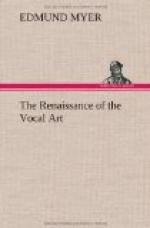“Why do not singers read or talk as they sing?” was a question once asked by a prominent elocutionist. “Why do not elocutionists sing as they talk or read?” I replied. This, of course, at once suggests an interesting subject for discussion. To give the reason in a general way, is simply to state that singers, as a rule, do not apply the principles of their art to the talking voice. Hence they often read and talk badly. The same is true, as a rule, of elocutionists. They do not apply the principles of their art when they attempt to sing.
The devices we use are a study of elastic vowel form and flexible articulation, applied by the emphasis and accent of important words in phrases and sentences. Then a study of the character and tone color necessary to express the meaning of the words. Then a use of the earnest, impressive, persuasive voice, as the text may demand. By using these forces or principles, as suggested by the thought and sentiment of the words, we arouse the emotional power, the magnetism of the voice, and thus influence the hearer. Through the elocution of singing we place our emotional, our personal expression upon a high and lofty plane. We thus express the central thought, the high ideals of the composer, and through the earnest, impressive voice impart them to the hearer.
ARTICLE FOUR.
THE SEVENTH PRINCIPLE OF ARTISTIC SINGING.
The seventh principle of artistic singing is
Interpretation.
Theory.—Singing means infinitely more than the use of words and music; it means the expression of the author’s idea as a whole.
Devices.—The application of all true principles by drawing, as it were, a mental and emotional tone-picture, as suggested by words and music.
The following article upon this subject was kindly written, especially for this book, by my friend and pupil, the well known teacher, Mr. John Randolph.
Interpretation in song is the faithful reproduction of the intention of both poet and composer. This reproduction includes the revelation of the characteristics of the poem itself, whether lyric, dramatic, or in other ways distinctive. It also reveals the musical significance of the composition to which the words are set. The melodic, rhythmic, and even harmonic values must be made clear to the hearer. But interpretation includes more than this reproduction, essential though it may be. If the expression of the intention of poet and composer fulfilled the sum total of interpretation, one performance would differ little from another. A clear-cut, automatic precision would be the result, perhaps as perfect as the repetition given out by a music-box and certainly no more interesting. Another element enters into interpretation. The meaning of the poem and its accompanying music must be displayed through the medium of a temperament capable of self-expression. A personal subjective quality




